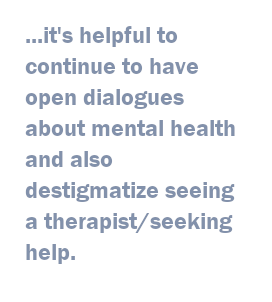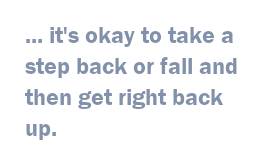

What would be a typical day for you?
I work in a Family Medicine clinic as a clinical psychologist or behavior health consultant. I usually spend my mornings reviewing records and make myself available to our primary care doctors for consultation. I spend the rest of the day seeing patients while also continuing to consult with providers on how to assist their patients with a number of different issues such as depression, anxiety, insomnia, acute and chronic pain, smoking cessation, weight management, etc. I usually try to engage in some form of self-care in the middle of my work day, whether it be mindfulness practice, taking a walk, or listening to music. Depending on the day of the week, I will usually work out with my husband.
 Are there particular mental health issues that
seem to impact the AAPI community more than others?
Are there particular mental health issues that
seem to impact the AAPI community more than others?
The most interesting thing about working in a primary care/family medicine clinic is that many of my AAPI patients are willing to be seen because they receive some nudging from their doctors who encourage them to talk to someone. Some of the most common issues impacting the AAPI community are stress/anxiety and depression, as well as chronic pain. Much of the time, mental health concerns are brought up in conjunction with other medical issues such as migraines, insomnia, or even during regular check-ups where some really keen doctors are able to ask the right questions of their patients in order to get to the core issues.
The stigma surrounding therapy and mental illness has been on the decline in recent years, but not as much in the AAPI community. Why do you think that is and what can we do to help change that?
There continues to be a stigma within the community because there is fear about perceptions - perceptions that a family didn't do enough to help one of its members, perceptions that an individual didn't do the right thing. There is a taboo related to talking about mental health issues. Much of the time, it is frowned upon to seek help because members are expected to rely either on the community itself or other appropriate resources such as a religious member (e.g., Catholics would see their parish priest). Though it has been mentioned often, it's helpful to continue to have open dialogues about mental health and also destigmatize seeing a therapist/seeking help. Much of the time, community members do not see any benefit from seeking therapy but if folx continue to share their stories about how seeking help has helped them, it may dispel some of those myths.
 With social media being such a big part of people’s lives, what
can we do to lessen its negative impact?
With social media being such a big part of people’s lives, what
can we do to lessen its negative impact?
I've seen many social media campaigns created for the AAPI community where folx have shared their stories. These campaigns have been powerful because some of the stories really resonate with the audience. Continuing to promote these campaigns while also developing programming in the community can also contribute to lessening the negative impact on mental health.
While the physical symptoms of Covid-19 are more clear, what are some of the mental effects that we should be aware of?
Some of the mental health effects of COVID include anxiety and depression. Anxiety has been the consequence of a number of different things such as being cautious around others due to fear of the disease spreading. Depression has also been a consequence of COVID as folx who are accustomed to being around friends and family, especially during the holidays, cannot do so due to social gathering restrictions or concern that they may place their medically at-risk family members/friends in harm's way. Throughout the pandemic, there has been anxiety as a consequence of the racism attributed to misinformation regarding COVID. Many in the community found themselves targets of racist actions because of misinformation spread about the origins of COVID.
What are some things that we can do to improve our mental state?
I think this is a toolbox I am constantly trying to build for myself. Some suggestions are:
- Stay Connected even if virtually. Though we are not able to hug our family members, we can still connect via phone call, text, Facetime, etc. Be creative about how you connect. I've seen some really awesome ways for folx to connect via virtual Happy Hours/Holiday celebrations, karaoke nights, etc.
- Ensure you are taking care of yourself
- Focus on some of the basics like getting adequate sleep/rest, eating as healthy as you can, limiting alcohol use, engaging in physical activity.
- Find some of the things that bring you joy and engage in them. Though many see their friends and family posting about all of the different activities that have kept them busy during the pandemic, it doesn't mean that one should do them especially if they're activities that they don't enjoy. Activities can be as simple as spending time with your pet, reading any type of book, magazine, blog that sparks your interest, taking a drive, watching the sunset/sunrise, etc. These smaller activities can still count towards improving your overall mental health
At what point should someone seek
professional help?
It is recommended that someone seek professional help when they or their loved ones notice severe changes in behavior (e.g. increasingly depressed or anxious, normally social and now isolating, not eating/sleeping, increased substance use that is concerning). Also, if a person is verbalizing or admits to experiencing suicidal thoughts or thoughts of harming others, it's recommended that the person be engaged with a mental health professional who can assist them.
What would be your motto?
Especially during this pandemic, my go-to motto has been "Fall down 7 times, get up 8." I've felt that I've needed to remind myself that at present, I don't need to do things perfectly or right the first time and that it's okay to take a step back or fall and then get right back up.
Images provided by The Asian
American Psychological Association (AAPA).